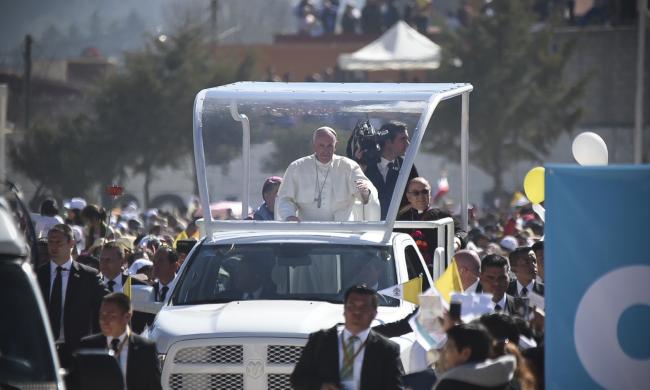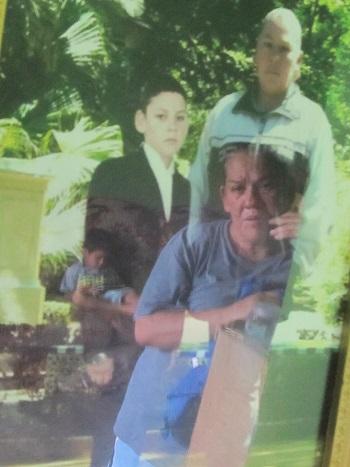
On Wednesday, Pope Francis will end his papal trip to Mexico in Ciudad Juárez, a city infamous for femicides and once dubbed the world’s “murder capital.” The Pope’s day in Juárez will begin with a prison visit, followed by a midday meeting with business leaders and workers, and will end with a 4 p.m. outdoor mass for around 220,000 ticket-holders. Though no part of the program will be specifically dedicated to the issue of violence in the city, church officials say the Pope plans to give a special blessing to victims of violence at some point in the day.
Ahead of the Pope’s visit, Juárez officials have been working overtime to project the image of a city that has moved on from its violent past. The murder rate in the city has dramatically decreased in recent years, something city officials have gone to great lengths to highlight. Greenery has been planted, walls freshly whitewashed and billboards erected with the pope’s image and the phrase “Juárez is Love.” A spokesman for the governor of the state of Chihuahua said the papal visit marks a “new era” for Juarez.
Not everyone is happy with Pope Francis’s trip to Mexico; criticisms range from the estimated $10 million that the government has spent on the visit to the absence of a meeting between the pope and victims of sexual abuse by clergy - although Proceso reported yesterday that it is "probable" the pope will meet with some victims.
Violence related to the War on Drugs is still a major problem for Mexico. The disappearance of 43 students from the Ayotzinapa Rural Teacher’s College in Iguala, Guerrero, has gripped the country for seventeen months now, with police and military officials implicated at every level. Even reporting on drug violence can be dangerous, as Mexico is one of the world’s most dangerous countries for journalists. Earlier this month Anabel Flores Salazar was kidnapped and murdered in the state of Veracruz, the third journalist killed in the country this year.
Despite lower crime rates, Juárez continues to be a major public relations challenge for the Mexican government. In January of this year the city was again included in a travel warning issued by the U.S. State Department. And victims of violence in the city have become frustrated with the persistence of legal impunity. Many are hoping the Pope’s visit will help to strengthen their longstanding demands on both the Mexican state and the U.S. government.
In 2010, Guadalupe Guereca’s 15-year-old son Sergio Adrián Hernandez Guereca was killed by a U.S. Border Patrol agent under one of Juárez’s international bridges. Despite clear evidence of excessive use of lethal force in Hernandez Guereca’s death, the agent, who fired his weapon from the U.S. side of the border, has faced no criminal charges. This lack of accountability applies to dozens of egregious civilian shootings by the Border Patrol, including six killed on Mexican soil and at least a dozen U.S. citizens. What’s more, the Hernandez Guereca case illustrates how impunity for violent crime is a truly binational issue.
Guereca and her lawyers have attempted to file a civil lawsuit in the U.S. against the Border Patrol agent who killed her son, but first she must wait for the U.S. Supreme Court to decide if the families of those killed on Mexican soil even have the right to file a lawsuit in U.S. courts. During the Pope’s visit to Juárez, Guereca hopes to deliver a letter to the pontiff and appeal to the Vatican to help find justice for her son’s death.
Pope Francis has spoken out about the failures of the War on Drugs – though the Catholic Church itself has played a dubious role in supporting it. In a speech last September at the UN, the Pope called it “a war which is taken for granted and poorly fought.” He said, “Drug trafficking is by its very nature accompanied by trafficking in persons; money laundering, the arms trade, child exploitation and other forms of corruption.”
The pope’s outspoken criticism of the War on Drugs and the violence it has caused is a major shift from the past when Mexican clerics were accused of ignoring the issue and even accepting drug money donations. Pope Francis has stated he wants to confront Mexico’s problems, not ignore them. In a video released by the Vatican before his visit, he argued that, “The Mexico of violence, the Mexico of corruption, the Mexico of drug trafficking, the Mexico of cartels, is not the Mexico our Mother wants.”
But despite such proclamations, the Pope is not expected to spend much time engaging with the communities in Mexico facing the highest rates of violence. Just a short drive from Ciudad Juárez itself, the Juárez Valley (Valle de Juárez) is one place the Pope will avoid during his time in the city. This rural, cotton-growing region remains devastated by years of extreme violence and is still considered one of the most dangerous parts of the country. Indeed, the vast majority of the Juárez Valley’s residents have fled the area, with many seeking political asylum in the U.S. In the small town of Guadalupe, the last surviving police officer was murdered last year. The mostly empty and burned homes and businesses have made the town a ghost of its former self.
Mexican president Enrique Peña Nieto flew to the Juárez Valley in a military helicopter on February 4 of this year to inaugurate a major new international bridge and highway project designed for truck traffic connecting Guadalupe to Tornillo, Texas. Former residents of Guadalupe and the Juárez Valley are worried they will permanently lose their homes and farms with the development and real estate speculation that is expected to follow the opening of the bridge.
In this way, the recent past is likely to be a prelude for the future in the Juárez Valley. Consider the case of the Reyes Salazars, a family of longtime social and environmental activists originally from the town of Guadalupe. In 1998, many members of the family were leaders in a binational campaign to strike down a proposal for a nuclear waste dump in Sierra Blanca, Texas, downriver from Juárez. In recent years, however, their lives have been torn apart; six members of the family were murdered between 2008 and 2011.
 Josefina Reyes Salazar, the first of four siblings to be murdered, became a prominent human rights activist after her son’s murder in 2008. She denounced abuses by the Mexican army, who had been sent to the Juárez Valley that same year. Violence skyrocketed after the troops arrived. Over 150,000 Mexicans have been killed since President Felipe Calderón mobilized the Mexican army to fight the Mexican Drug War in 2006, with financial and material support from the United States. Surviving Reyes Salazar family members suspect the military had a role in their loved ones’ deaths.
Josefina Reyes Salazar, the first of four siblings to be murdered, became a prominent human rights activist after her son’s murder in 2008. She denounced abuses by the Mexican army, who had been sent to the Juárez Valley that same year. Violence skyrocketed after the troops arrived. Over 150,000 Mexicans have been killed since President Felipe Calderón mobilized the Mexican army to fight the Mexican Drug War in 2006, with financial and material support from the United States. Surviving Reyes Salazar family members suspect the military had a role in their loved ones’ deaths.
Pope Francis’s visit to Juárez will come during the fifth anniversary of the murders of siblings Magdalena and Elías Reyes Salazar and Elías’s wife, Luisa Ornelas, all of whom were kidnapped in February 2011 and found dead two weeks later.
There will be no members of the Reyes Salazar family in Juárez to see the Pope this week, as all the survivors have fled. Over thirty members of the family sought political asylum in the U.S. The matriarch of the family, Sara Salazar, who turned 80 in January, lives with the family of her only surviving son, Saúl Reyes, in Fabens, Texas just a short distance across the border from Guadalupe.
This week Saúl Reyes is among those who are highly critical of how the Mexican government is spinning the papal visit. “I recognize the Pope’s humility, sincerity, and good intentions,” he said. “But it’s unfortunate his image and visit is being utilized as an opiate for the Mexican people to distract from the millions demanding justice on every level throughout the country.”
Victims of violence and social inequities are hoping their cries for justice will gain strength with the papal trip to Mexico, but Guadalupe Guereca and the Reyes Salazar family know that the visit of the enormously popular leader of the Catholic Church won’t move any mountains. They’ll still be waiting for justice long after the Pope is gone.
Richard Boren is a freelance writer and video producer based in the Arizona/Sonora borderlands. He blogs at Hobo Dispatch.

